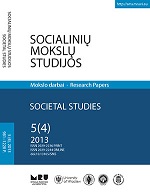Švietimo politikos, ugdymo kokybės ir paslaugų vartotojų poreikių tenkinimo sąsajos
Connections of Education Policy, Training Quality and Provided Services of Users’ Needs
Author(s): Dalia Martišauskienė, Kęstutis TrakšelysSubject(s): Social Sciences
Published by: Mykolas Romeris University
Keywords: education policy; education quality; service users̕ needs
Summary/Abstract: In the article, it is accented that the modern Lithuanian education policy requires guaranteeing a possibility for a child to use the services provided by the state and at the same time, it enables education institutions to create more various education and social service forms, meeting children/youth needs. It is noted that the aim of the activities of education institutions, as of other organizations, is the provision of users’ needs. This is why it so important to understand that users of services are the most important people, because the users do not depend on the institution, but the institution depends on them. The opinion is presented that a child is the user of education institution, his/her parents or, in other words, family, which can orient the child’s behavior according to religion, politics, economics, personal ambitions, etc. In the article, the problem is analysed that until now in Lithuania there has been a lack of consensus among the formed state, regional education policy, provided service quality and provision of users’ needs to guarantee a possibility for a child to use the services provided by the state, giving as many various education services as possible, meeting child/youth needs, and constantly seeking for the quality of educational, social and other services. The main information sources of the empirical research have been parents of Klaipėda region, whose children attend education institutions. The results of the empirical research revealed that education institution, aiming to provide the quality of services, has to identify different parents’ (group and individual) needs, expectations, experience of attendance, values, and to involve them into creation of educational activities and institution, motivate collaboration with providers of education services. Also, the article provides the general respondents’ opinion about the features specific for the education quality, provided educational, social and other quality of services and agreement with the formed state education policy.
Journal: Socialinių mokslų studijos
- Issue Year: 5/2013
- Issue No: 4
- Page Range: 1124-1137
- Page Count: 14
- Language: Lithuanian

